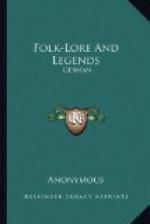“This place, then, must have been famed in days of yore, my friend?”
“Ye may tak my word for that,” said he, “’Od, it was a place! Sic a sight o’ fechtin’ as they had about it! But gin ye’ll gan up the trap-stair to the laft, an’ open Jenny’s kist, ye’ll see sic a story about it, printed by ane o’ your learned Aberdeen’s fouk, Maister Keith, I think; she coft it in Aberdeen for twal’ pennies, lang ago, an’ battered it to the lid o’ her kist. But gang up the stair canny, for fear that you should wauken her, puir thing; or, bide, I’ll just wauken Jamie Fleep, an’ gar him help me down wi’t, for our stair’s no just that canny for them ‘t’s no acquaint wi’t, let alane a frail man wi’ your infirmity.”
I assured him that I would neither disturb the young lady’s slumber nor Jamie Fleep’s, and begged him to give me as much information as he could about this castle.
“Weel, wishin’ your guid health again.—Our minister ance said that Solomon’s Temple was a’ in ruins, wi’ whin bushes, an’ broom and thistles growin’ ower the bonnie carved wark an’ the cedar wa’s, just like our ain abbey. Noo, I judge that the Abbey o’ Deer was just the marrow o ’t, or the minister wadna hae said that. But when it was biggit, Lord kens, for I dinna. It was just as you see it, lang afore your honour was born, an’ aiblins, as the by-word says, may be sae after ye’re hanged. But that’s neither here nor there. The Cummins o’ Buchan were a dour and surly race; and, for a fearfu’ time, nane near han’ nor far awa could ding them, an’ yet mony a ane tried it. The fouk on their ain lan’ likit them weel enough; but the Crawfords, an’ the Grahames, an’ the Mars, an’ the Lovats, were aye trying to comb them against the hair, an’ mony a weary kempin’ had they wi’ them. But some way or ither they could never ding them; an’ fouk said that they gaed and learned the black art frae the Pope o’ Room, wha, I myself heard the minister say, had aye a colleague wi’ the Auld Chiel. I dinna ken fou it was, in the tail o’ the day, the hale country raise up against them, an’ besieged them in the Abbey o’ Deer. Ye’ll see, my frien’” (by this time mine host considered me as one of his cronies), “tho’ we ca’ it the abbey, it had naething to do wi’ papistry; na, na, no sae bad as a’ that either, but just a noble’s castle, where they keepit sodgers gaun about in airn an’ scarlet, wi’ their swords an’ guns, an’ begnets, an’ sentry-boxes, like the local militia in the barracks o’ Aberdeen.
“Weel, ye see, they surrounded the castle, an’ lang did they besiege it; but there was a vast o’ meat in the castle, an’ the Buchan fouk fought like the vera deil. They took their horse through a miscellaneous passage, half a mile long, aneath the hill o’ Saplinbrae, an’ watered them in the burn o’ Pulmer. But a’ wadna do; they took the castle at last, and a terrible slaughter they made amo’ them; but they were sair disappointed in ae partic’ler, for Cummin’s fouk sank a’ their goud an’ siller in a draw-wall, an’ syne filled it up wi’ stanes. They got naething in the way of spulzie to speak o’; sae out o’ spite they dang doon the castle, an’ it’s never been biggit to this day. But the Cummins were no sae bad as the Lairds o’ Federat, after a’.”




